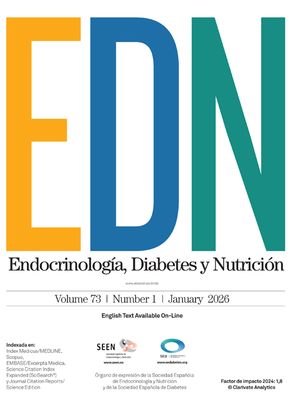Central hypothyroidism is commonly associated with impaired secretion of other anterior pituitary hormones, while isolated impairment of TRH-TSH-thyroid hormone axis was mostly identified in children and is a result of genetic mutations including TSH beta subunit gene or less commonly TRH receptor gene mutations. There are also a few reports of adult-onset isolated central hypothyroidism due to pituitary adenoma or empty sella. Here we present a case of adult-onset idiopathic isolated central hypothyroidism with no apparent morphological changes of the pituitary.
A 52-year-old female patient was referred to our endocrinology clinic for suspicion of central hypothyroidism in December 2007. She had been taking thyroid hormone supplementation for the past four years. She was not sure if the pill contained only T4 or a combination of T3 and T4. In April 2007, she started to notice hair loss, fatigue, and weight gain while she was still on the thyroid hormone supplementation. At that time, TSH was at 1.59mcU/ml (normal range reference values not available for that lab), free T4 was at 0.6ng/dl (normal range: 0.8–1.8) and total T3 was at 89ng/dl (normal range: 60–181). Her other medical problems included orthostatic hypotension and depression for which she took midodrine and trazodone. She was not sure whether any of her family members had thyroid disorders. On physical exam, there was no remarkable finding. Repeated blood test showed free T4 of 1.3ng/dl (normal range: 0.8–2.7 ng/dl), free T3 of 2.3pg/ml (normal range: 2.4–4.2pg/dl) and TSH of 0.02mcU/ml (normal range: 0.39–4.60mcU/ml). The concentrations of other pituitary hormones/markers were all within normal ranges. MRI (magnetic resonance imaging) showed a normal pituitary. She started to take levothyroxine 100mcg daily and her symptoms improved. She developed no other pituitary hormone deficits in the ensuing six years.
This patient developed hypothyroidism as an adult with no clear family history of hypothyroidism. Clinical and biochemical findings were compatible with isolated central hypothyroidism. Repeated thyroid hormone and TSH measurements showed pattern of central hypothyroidism again and T4 levels appropriately increased after thyroxine replacement, which together made the interference in the assays unlikely to be the reason for the laboratory results. MRI of the pituitary did not show any abnormality. She did not have any critical illness and had not undergone thyroid surgery, radioiodine therapy, or had received any steroid, anticonvulsant or any anti-thyroid medication at the time of thyroid hormone measurements. The two medications that she was taking have not been reported to interact with thyroid hormones. We could not find any clear etiology for her hypothyroidism. Therefore, we named the disease as “adult-onset idiopathic isolated central hypothyroidism”.
Based on our literature search, there were a total of eight patients with clear evidence of “adult-onset idiopathic isolated central hypothyroidism” reported since 1950.1–5 The patients were located in Japan, U.S.A., U.K. and Spain. They were predominately female and the age of onset ranged from 20 to 70. Pituitary imaging did not show any morphological abnormality and the other pituitary hormones were within normal limits. They all presented with symptoms similar to peripheral hypothyroidism and responded well to thyroxine treatment without progressing to panhypopituarism. Yamakita et al. reported five patients with this condition in two articles.1,2 They postulated that isolated central hypothyroidism could be an initial stage of lymphocytic adenohypophysitis (LAH).2 The etiology of LAH was unclear and an autoimmune process was suspected as anti-pituitary antibodies were detected in five out of the six patients in their first report.1 Anti-pituitary antibodies were also detected in another patient who presented with central hypothyroidism and central hypoadrenalism.6 In two other reports,3,4 the etiology of this disease entity was not further explored. In the report by Prieto-Tenreiro et al.,5 they suggested that the condition is most likely a hypothalamic disease, as evidenced by a surge in TSH secretion after TRH stimulation. However, TRH level was not measured and no structural abnormality of the hypothalamus was found on MRI. Other previous studies revealed that dysfunction of TSH secretion usually requires higher degree of pituitary damage than dysfunction of gonadotropin secretion does.7 The reason why TSH secreting function is lost first in isolated central hypothyroidism is unclear. If it is due to an autoimmune process, then the auto-antibodies most likely only target TSH- or TRH-secreting cells.
A few possible cases of “adult-onset idiopathic isolated central hypothyroidism” have been reported. In one report, however, some anterior pituitary hormones were not tested.8 In two reports, pituitary imaging results were not stated.8,9 Thyroid hormone levels or TSH levels were not directly measured in two reports.8,10 In addition, Gharib et al.4 did not test some anterior pituitary hormones in the first three cases in their article.
In conclusion, the present case and earlier reports demonstrate that adult-onset idiopathic isolated central hypothyroidism may not be very rare. It is unlikely to be inherited. It may be an autoimmune disease with auto-antibodies targeting TSH- or TRH-secreting cells, since most patients did not present with or progress to panhypopituitarism. It is unlikely due to local mass effect in the pituitary based on the imaging results. Furthermore, direct measurement of TRH might be necessary for evaluation of patients with central hypothyroidism in the future, as it might help us ascertain the exact location of the disease.
Conflict of interestThe authors have no conflict of interest to be disclosed.
Please cite this article as: Tang C, Yu R. Hipotiroidismo idiopático central aislado de inicio en la edad adulta: informe de un caso y revisión de la literatura. Endocrinol Nutr. 2014;62:49–50.




